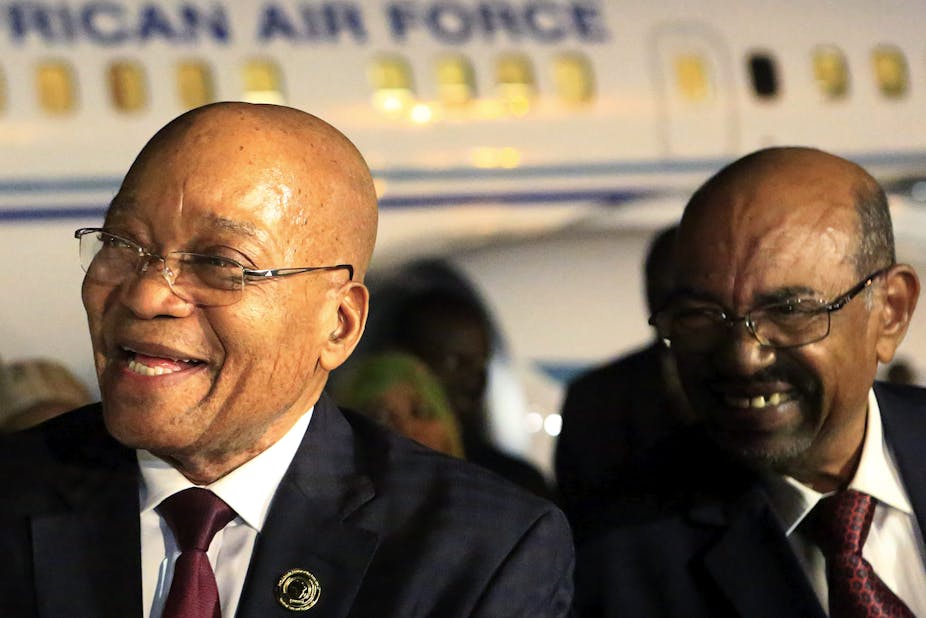South Africa appears almost destined to withdraw from the International Criminal Court (ICC) if the governing African National Congress has its way. A hardening of the party’s position comes after the fallout over the government’s failure to arrest Sudanese President Omar al-Bashir, a fugitive from international law.
But, if it succeeds, the move could have mere symbolic value. As a member of the United Nations, South Africa will continue to have international obligations to binding decisions taken by the UN Security Council – even those pertaining to the ICC. This is true even if it is no longer a member of the Rome Statute under which the ICC was set up.
The decision to leave the ICC gained force at the governing ANC’s policy review conference in October. The move must still be approved by parliament and will only take effect a year after the ICC has been notified.
The decision came shortly after the government had lost an appeal against an earlier court ruling that it must prevent al-Bashir from leaving the country after attending an African Union summit in Johannesburg.
This court ruling was the second against the government involving the Rome Statute. In 2014, it was ordered by South Africa’s Constitutional Court to investigate claims of crimes against humanity committed in Zimbabwe by members of President Robert Mugabe’s governing ZANU-PF party. They were known to be travelling to South Africa from time to time.
The Constitutional Court invoked South Africa’s duties under the Rome Statute and the country’s own ICC Act of 2002.
A host of objections to the ICC
The ANC believes that the “ICC has lost its direction”. Accordingly Ribbon Mosholi, the ANC’s international relations manager, objects to the “geopolitical context” in which the ICC operates.
This is diplomatic speak for powerful states that refer cases to the ICC in their capacity as permanent members of the UN Security Council while they themselves are not members of the Rome Statute. These are the US, China and Russia. The US is usually singled out here. The ANC is closer to China and Russia, which is why they are seldom, if at all, mentioned.
This needs closer analysis.
The power to refer cases to the ICC is given to the UN Security Council under Article 13(b) of the Rome Statute. When referring events that need investigation to the ICC, the Security Council acts under Chapter VII of the UN Charter, which deals with threats to international peace and security.
A referral by the Security Council under Chapter VII is binding on all UN member nations. But a referral also needs the concurring votes of the five permanent members – US, UK, France, China and Russia. Any one of them can veto a referral. Thus, the geopolitical context the ANC is so unhappy about is an inherent feature of the UN Charter, which has been in place since 1945. To blame the ICC for it is disingenuous.
African leaders also like to invoke what they call the ICC’s targeting of African states. There is a point in this argument if it means that the ICC turns a blind eye to atrocities in other, non-African, countries. But this argument is losing its allure. The current list of preliminary investigations by the ICC clearly shows that it has a number of non-African countries in its sights. These include Afghanistan, Iraq and Colombia.
There are other grounds for the ANC’s anti-ICC stance – echoed by President Jacob Zuma and other government officials. The first is the High Court ruling on al-Bashir. This obviously embarrassed the South African government. And being the governing party, the ANC had to act in solidarity with the government.
Another, and perhaps more compelling, reason is the predilection of African leaders to protect sitting heads of state, no matter how grave the allegations against them. No wonder the ANC has called for an amendment to South Africa’s ICC Act so that sitting heads of state can enjoy immunity against criminal proceedings involving international crimes.
This follows the 2014 African Union Summit decision to amend the Protocol of the African Court of Justice and Human Rights so that sitting heads of state and government and other senior government officials can claim immunity against criminal proceedings for mass atrocities in the African Court.
There is obviously no sensitivity for the rights of victims who may have suffered unimaginable brutalities through state-sponsored terror campaigns.
South Africa’s obligations extend beyond the ICC
The al-Bashir case, and others, may remain a headache for the South African government – even as a non-party to the Rome Statute.
For instance, as a UN member the country may still have to honour binding Security Council resolutions urging all states to cooperate fully with the ICC as is the case with Resolution 1593. This resolution referred the situation in Darfur to the ICC. It forms the basis for the indicment of al-Bashir for atrocities and mass murder.
On October 26, the resolution was invoked by the ICC’s Chief Prosecutor to request India – a non-party to the Rome Statute – arrest and surrender al-Bashir. At the time it was known that al-Bashir intended to attend an India-Africa Summit in New Delhi at the invitation of the Indian government.
While the ANC is contemplating its next move, the South African government still owes the ICC an explanation for its failure to arrest and surrender al-Bashir. The ICC gave South Africa until October 5 to respond.
Claiming that the local courts are still “seized” with the matter, South Africa requested an extension of time. It now has until December 31 to inform the ICC of the status of developments. In granting the extension, the ICC confirmed South Africa’s continuing obligations to arrest and surrender al-Bashir.

